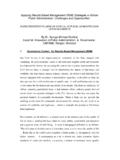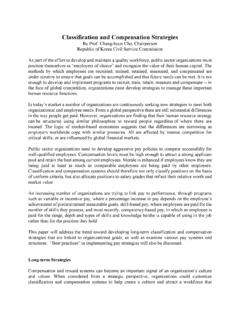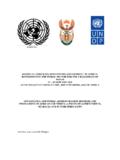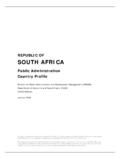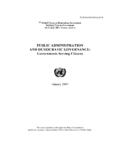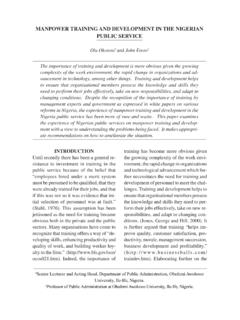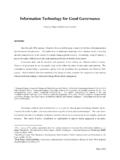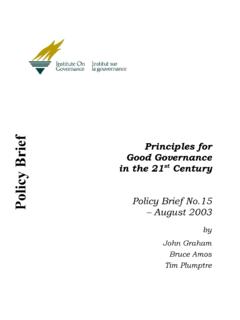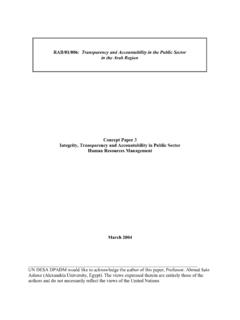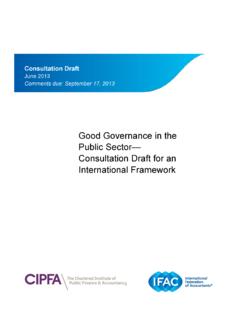Transcription of Integrity, Transparency and Accountability in Public ...
1 E c o n o m i c& S o c i a l A f f a i r s integrity , Transparency and Accountability in Public Administration:Recent Trends, Regional and International Developments and Emerging Issues Elia Armstrong August 2005 United Nations Contents I. integrity , Transparency and Accountability in Public Administration .. 1 II. Resurgence of integrity , Transparency and 2 III. Developments in European, Arab, Sub-Saharan, Latin Amrican and Asia-Pacific Countries .. 4 IV. Developments at the International Level .. 6 V. Emerging Issues .. 8 VI. Conclusion .. 8 References .. 10 I. integrity , Transparency and Accountability in Public Administration The United Nations (UN) offers a unique van-tage point from which to view developments in Public administrations around the globe. The consensus of its membership on the state of and directions for Public administration sets inter-national International cooperation among many of the 191 Member States allow the Secretariat to keep a finger on the pulse of developments around the world.
2 The concepts of integrity , Transparency and Accountability have been identified by the UN countries, collectively and individually, as part of the founding principles of Public As such, these principles need to be espoused and seen to be practiced by the leadership within the UN System and in all member countries. In Public administration, integrity refers to honesty or trustworthiness in the discharge of official duties, serving as an antithesis to corruption or the abuse of office. Transparency refers to unfettered access by the Public to timely and reliable information on decisions and performance in the Public sector . Accountability refers to the obligation on the part of Public officials to report on the usage of Public resources and answerability for failing to meet stated performance objectives. But what do these terms mean, in the abstract and con-cretely, for the UN administration and for the administrations of its Member States?
3 In the abstract, for the UN s own administration, integrity has been defined as includ(ing), but 1 The consensus is expressed in the General Assembly (GA) resolutions on Public Administration and Development: A/RES/49/136 of 1994, A/RES/50/225 of 1996, A/RES/53/201 of 1999, A/RES/56/213 of 2002, A/RES/57/277 of 2002 and A/RES/58/231 of 2004. 2 The UN Charter states, The paramount consideration in the employment of the (UN) staff .. shall be the necessity of securing the highest standards of efficiency, competence and integrity . (Article 101) In addition, many Member States identify integrity , Transparency and Accountability among core values or founding principles for their Public administrations in their constitutions and relevant laws. not limited to probity, impartiality, fairness, honesty and truthfulness."3 The need for Transparency , though not defined explicitly, has been implied in the founding documents.
4 More recently, the Organization has acknowledged the need to foster more Transparency in access to information, procurement and senior level The Organization s staff regulations state that staff members are accountable to the Secretary-General for the proper discharge of their functions 5, highlighting the importance of Accountability for performance. Moreover, a sampling of the member countries turns up many abstract aspirations. For instance, in Yemen, to uphold integrity , Public servants must neither solicit nor accept anything from their fellow citizens to perform their duties, thus creating a climate of confidence in themselves and in the Public service as a whole. 6 In South Africa, Transparency must be fostered by providing the Public with timely, accessible and accurate information. 7 In the United Kingdom, Accountability is a standard of Public life, where holders of Public office are accountable for their decisions and actions to the Public and must submit themselves to whatever scrutiny is appropriate to their offices.
5 8 Thus at the abstract level, these principles are co-dependent. integrity , by requiring that Public interest be paramount, provides the basis for Transparency and Accountability . Transparency without Accountability becomes meaningless and makes a mockery of sound Public administra-tion. Accountability depends on Transparency or 3 UN Staff Regulations (b) 4 UN Fact Sheet on management reform measures, 08/04/05: 5 UN Staff Regulations 6 Yemeni Civil Service Act No. 19 (1991) and By-Law No. 122 (1992), cited in forthcoming UN Report, Public sector Transparency and Accountability in Selected Arab Countries: Policies and Practices 7 Constitution of the Republic of South Africa, 1996, Chapter 10, Article 195 (g) 8 House of Commons Committee on Standards in Public Life. Seven Principles of Public Life, http://www. 2 integrity , Transparency and Accountability in Public Administration having the necessary information.
6 And trans-parency and Accountability without integrity may not end up serving the Public interest. Concretely, these concepts can be translated into an ethics infrastructure or a national integrity system of mutually reinforcing legislative standards, institutional structures and admini-strative procedures that ensure that Public servants will put the interest of the Public above their The Organisation for Economic Cooperation and Development (OECD) concept of an ethics infrastructure is a set of rules, institutions and practices that are in place to guide, manage and enforce good conduct in the Public sector . It is composed of mutually reinforcing functions and elements to achieve the necessary coherence and synergy to support an environment to encourage high standards of behaviour. The Transparency International (TI) concept of a national integrity system describes the key institutions integral to combating corruption.
7 The nine pillars of the system include the executive, civil society, private sector , champion of reform, judiciary, en-forcement agencies, media, watchdog agencies, and parliament. They affect the three spheres of rule of law, sustainable development and quality of life. More immediately, these principles can translate into improved lives of the poor and vulnerable. Then can assist daily actions for achieving internationally agreed-upon goals such as the outcomes of major UN conferences and summits, including the Millennium Develop-ment Goals (MDGs). The MDGs are the concrete targets set by the international community in 2000 to halve world poverty by 2015. The eight goals include: eradicating extreme poverty and hunger, achieving universal primary education, promoting gender equality and empowering women, reducing child mortality, improving maternal health, combating HIV/AIDS and other diseases, ensuring 9 Ethics infrastructure is a term coined by the OECD in Ethics in the Public Service, Occasional Paper No.
8 14 (1996) and National integrity system is a term coined by Jeremy Pope and Transparency International in the first Source Book, latest edition 2000. environmental sustainability and a global part-nership for development. To date, the world is falling short in reaching these targets. Although achievement rates vary from region to region and country to country, South East Asia leads the pack and Africa trails. The reasons for poor performance in achieving these goals are governance weaknesses, poverty traps false diagnoses and unrealistic expecta-tions, uneven development access to and distribution of resources, and policy gaps. Included among governance weaknesses are the issues of trust in government that provides social cohesion and the existence of a national ethos and commonly shared core values. A service-oriented Public sector , basic to meeting the MDGs, depends on the integrity , Transparency and Accountability of Public institutions.
9 In the rest of this Discussion Paper, I identify some emerging issues around safeguarding integrity , Transparency and Accountability in Public administrations around the world. In doing so, I will very briefly highlight some recent trends in the integrity , Transparency and Accountability movement and broadly describe some developments at the regional and international levels, focusing more on those initiatives in which the UN has been more directly involved. II. Resurgence of integrity , Transparency and Accountability The values of integrity , Transparency and Accountability in Public administrations have enjoyed a resurgence within the past three decades or so. Sound Public administration involves Public trust. Citizens expect Public servants to serve the Public interest with fairness and to manage Public resources properly on a daily basis.
10 Fair and reliable Public services and predictable decision-making inspire Public trust and create a level playing field for businesses, thus contributing to well-functioning markets and economic growth. The integrity , trans-parency and Accountability of Public admini-strations are a prerequisite to and underpin integrity , Transparency and Accountability in Public Administration 3 Public trust, as a keystone of good governance. Corruption and maladministration in this context could be seen as not only individual acts but also the results of systemic failure and indication of weak governance. Publicized corruption and administrative failure cases have had a major negative impact on trust in Public decision-making. Since the end of the Cold War, the world has witnessed spreading democratization, a shift in balance between the state and market forces as more countries seek to integrate into global capitalism, and changes in social mores that inevitably accompany such political and economic transformations.
